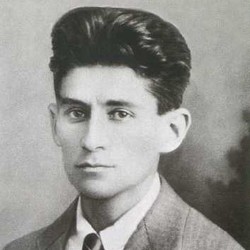
Kafka’s is the art of comic exasperation deploying absurd, even paranoid pseudo logic, labyrinthine insurance company and regulatory double-thought and dead-end speak, at one point probably convincing Derrida and the rest of the deconstructionists to become plumbers.
Of course, calling officials, their projects and indirectly the Government itself the Arrangement, says a lot about Kafka’s own state of mind. (Personally, I think the Deranged is more like it!), but he still created world literature out of the texts that as an insurance lawyer and later a Workman’s Compensation Board verifier, engulfed him. He imitated the structures of treacherously simplistic but circular language so prevalent in his daily work. Additionally, the endless incompetence and deliberate deception on the part of both the authorities and the public constantly placed him smack in the middle of one contention or another. It triggered his Walter Mitty-like imagination out of self-defence, this day-dreaming both escape and a distancing from recurrent nightmares, offsetting them and other health problems while preserving his sanity.
‘The crows maintain that a single crow could destroy heaven. This is beyond a doubt, but doesn’t prove anything against heaven, since heaven means, precisely, the impossibility of crows!’ is a famous example of a statement of breath-taking incongruity. It only makes one laugh, and even by saying the absence of crows wouldn’t make it much clearer, only a dyslexic atheist perhaps debating the impossibility… of dogs instead of gods, but in the case at hand there could be a translation problem. Anyway, the whole thing a bit like saying a statement by a person doesn’t make sense, because the man is mute. Also a non sequitur, what?
Yes, Kafka was a great tragicomic figure, one for whom in the end even a fire hydrant represented some sort of totalitarian threat. His humour was all part of that self-defence, as was exaggeration. For I visited the castle in Prague; it’s an innocent enough structure, housing contemporary government offices, but as it’s located on a hill overlooking the Moldau, in his dreamy eyes it exercises an authority far beyond its real scope.
Yes, the Prague Castle is as innocent as one on a medieval Spanish hilltop, in particular those high coastal fortifications and watch towers in Andalusia, constructed to keep exactly who (?) out, as the invaders were and had been… the Moors themselves!? Part of a paranoiac ‘arrangement’, in other words, the Moors ultimately getting defeated in the interior of the Iberian peninsula, as was to be expected, and by the Christian Kings, not by wily Barbary Coast pirates or some other imaginary naval force. So that these castles were not what they were cracked up to be, more part of someone’s fantasy, as in the case of Kafka.
Shades of combating windmills then, and Don Quijote. Taken in mostly by the symbolism of the Prague Castle, Kafka did set out to unmask that menacing old fool behind the curtain, much like Dorothy in the Wizard of Oz, at the end of the day both lodging victory. For Kafka is not only Don Quijote, Kafka is Dorothy, but a much better writer than she!
Yes, when you’ve lived long enough in Spain, especially when this “in” refers to the parts where some say they’d rather be “out”, it’s Kafka alive and, especially, kicking.
For you can kick it as much as you want, the beast remains the same and always lacking humour. The easy-goingness is just skin deep. Kafka new this one too. But he, at least, had Milena.
The comment about the castles is somewhat confusing, so I am not sure if I understand it correctly. In any case, the danger of attack from pirates from the Barbary Coast in the late middle ages was certainly real, not paranoia, and the watchtowers, sorely needed.
Most places along the Mediterranean coast were raided very frequently and even became depopulated.
A raid is not an invasion, a boat is not an armada, the castle in Monda where I live is 15 km from the beach though you can see the sea from high up there, in those years it would take two days on a mule to get there, so are you telling me this castle was built to hold off the pirates or simply to display power to some non-existent enemy?